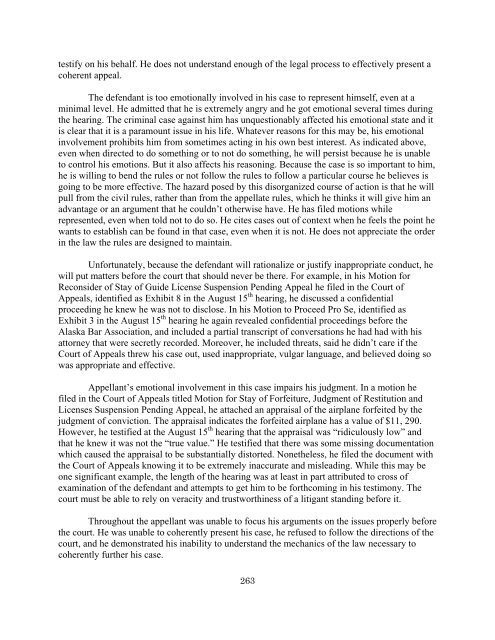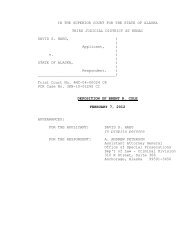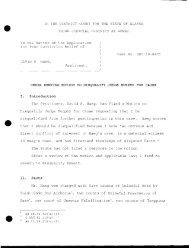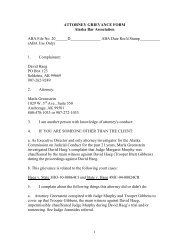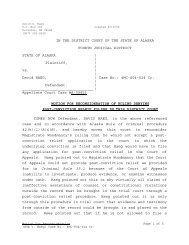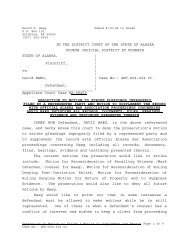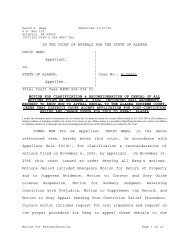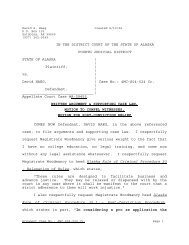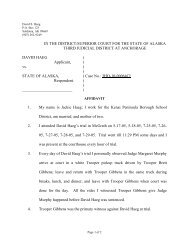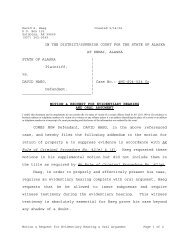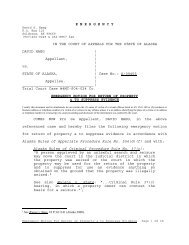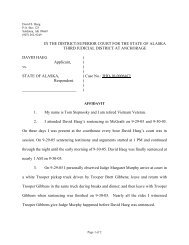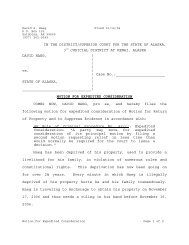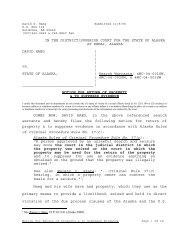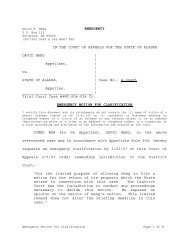PCR Exhibits - Alaska State of Corruption
PCR Exhibits - Alaska State of Corruption
PCR Exhibits - Alaska State of Corruption
You also want an ePaper? Increase the reach of your titles
YUMPU automatically turns print PDFs into web optimized ePapers that Google loves.
testify on his behalf. He does not understand enough <strong>of</strong> the legal process to effectively present a<br />
coherent appeal.<br />
The defendant is too emotionally involved in his case to represent himself, even at a<br />
minimal level. He admitted that he is extremely angry and he got emotional several times during<br />
the hearing. The criminal case against him has unquestionably affected his emotional state and it<br />
is clear that it is a paramount issue in his life. Whatever reasons for this may be, his emotional<br />
involvement prohibits him from sometimes acting in his own best interest. As indicated above,<br />
even when directed to do something or to not do something, he will persist because he is unable<br />
to control his emotions. But it also affects his reasoning. Because the case is so important to him,<br />
he is willing to bend the rules or not follow the rules to follow a particular course he believes is<br />
going to be more effective. The hazard posed by this disorganized course <strong>of</strong> action is that he will<br />
pull from the civil rules, rather than from the appellate rules, which he thinks it will give him an<br />
advantage or an argument that he couldn’t otherwise have. He has filed motions while<br />
represented, even when told not to do so. He cites cases out <strong>of</strong> context when he feels the point he<br />
wants to establish can be found in that case, even when it is not. He does not appreciate the order<br />
in the law the rules are designed to maintain.<br />
Unfortunately, because the defendant will rationalize or justify inappropriate conduct, he<br />
will put matters before the court that should never be there. For example, in his Motion for<br />
Reconsider <strong>of</strong> Stay <strong>of</strong> Guide License Suspension Pending Appeal he filed in the Court <strong>of</strong><br />
Appeals, identified as Exhibit 8 in the August 15 th hearing, he discussed a confidential<br />
proceeding he knew he was not to disclose. In his Motion to Proceed Pro Se, identified as<br />
Exhibit 3 in the August 15 th hearing he again revealed confidential proceedings before the<br />
<strong>Alaska</strong> Bar Association, and included a partial transcript <strong>of</strong> conversations he had had with his<br />
attorney that were secretly recorded. Moreover, he included threats, said he didn’t care if the<br />
Court <strong>of</strong> Appeals threw his case out, used inappropriate, vulgar language, and believed doing so<br />
was appropriate and effective.<br />
Appellant’s emotional involvement in this case impairs his judgment. In a motion he<br />
filed in the Court <strong>of</strong> Appeals titled Motion for Stay <strong>of</strong> Forfeiture, Judgment <strong>of</strong> Restitution and<br />
Licenses Suspension Pending Appeal, he attached an appraisal <strong>of</strong> the airplane forfeited by the<br />
judgment <strong>of</strong> conviction. The appraisal indicates the forfeited airplane has a value <strong>of</strong> $11, 290.<br />
However, he testified at the August 15 th hearing that the appraisal was “ridiculously low” and<br />
that he knew it was not the “true value.” He testified that there was some missing documentation<br />
which caused the appraisal to be substantially distorted. Nonetheless, he filed the document with<br />
the Court <strong>of</strong> Appeals knowing it to be extremely inaccurate and misleading. While this may be<br />
one significant example, the length <strong>of</strong> the hearing was at least in part attributed to cross <strong>of</strong><br />
examination <strong>of</strong> the defendant and attempts to get him to be forthcoming in his testimony. The<br />
court must be able to rely on veracity and trustworthiness <strong>of</strong> a litigant standing before it.<br />
Throughout the appellant was unable to focus his arguments on the issues properly before<br />
the court. He was unable to coherently present his case, he refused to follow the directions <strong>of</strong> the<br />
court, and he demonstrated his inability to understand the mechanics <strong>of</strong> the law necessary to<br />
coherently further his case.<br />
263


